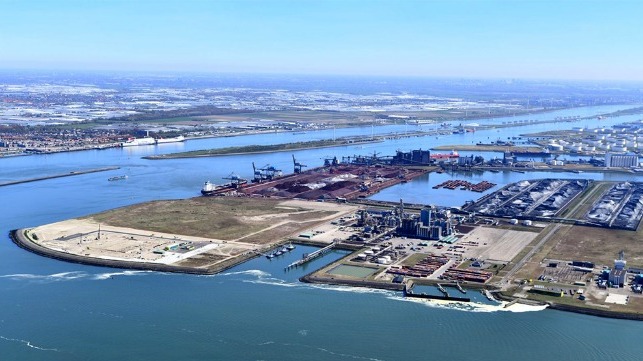Port of Rotterdam Reports Volume Declines but Accelerates Investments

Like most of the ports around the world, the Port of Rotterdam experienced strong declines in volumes during the first half of 2020 due primarily to the disruptive impact of the COVID-19 pandemic on the economy.
The Port of Rotterdam Authority reported a nine percent drop in volumes for the six months with the strongest declines in dry bulk cargoes. Based on current conditions, they also expect that volumes will largely remain unchanged for the second half of the year, meaning that 2020 volumes will be down significantly versus 2019.
“The Dutch economy and the port of Rotterdam are dependent on developments in world trade. The negative economic impact of the COVID-19 pandemic is being felt worldwide. It should therefore come as no surprise that throughput volumes in the past six months were considerably lower than in the same period last year. On the positive side, the throughput volumes in the second quarter turned out to be better than initially expected,” commented Allard Castelein, CEO of the Port of Rotterdam Authority.
Reviewing the port’s results by category the container business showed a small decline with volumes down just over three percent in tons or seven percent in the number of TEUs. The port noted that while exports had risen, imports from Asia were down resulting in a lower number of empty containers being handled at the port. Also, the shipping companies canceled up to 20 percent of all their service to Rotterdam in May and June, which was only partially offset by an increase in the size of the container ships calling at the port.
Other categories however were more severely impacted during the first half of 2020. Most of the declines were during the second quarter when the lockdowns were in place in Western Europe. Dry bulk volumes fell nearly 20 percent due to low iron ore and scrap used by the steel industry and lower coal volumes. Breakbulk volumes fell by 11 percent while ro-ro throughput was down by 12 percent.
Liquid bulk volumes were also down nearly 10 percent, with liquid bulk accounting for nearly half the total throughput in Rotterdam. Fuel oil volumes experienced the steepest decline in the category with only a small decline in crude oil volumes and a small increase in LNG throughput.
Discussing the outlook, Castelein said, “the Port Authority has conducted a review to determine which public-private investment projects can be accelerated. In that way, the government and the port of Rotterdam can team up to further the sustainability of the economy, while giving it a kick-start at the same time.”
The port highlighted its involvement with a broad range of energy and digitization projects. This includes the establishment of an inland shipping system with exchangeable batteries, and development work for the construction of a green hydrogen plant and a hydrogen network in the port. The Port of Rotterdam Authority continues to review projects looking at ones that can be accelerated to assist in the economic recovery.
In the first half of 2020, gross investments totaled more than $150 million and they expect to maintain investments for the full year at a level similar to last year, which was nearly $400 million.
The port concluded that while it expects a cautious recovery in the second half of 2020, it noted that it would depend on the possibility of a second wave of the coronavirus as well if the EU and UK would conclude post-Brexit trade agreements.
